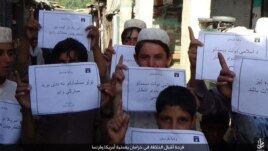05 September, 2016
Islamic State forces have often used images of child soldiers as a propaganda tool.
One of the latest examples was a video released last week. It showed five children appearing to execute a group of Kurdish prisoners in Syria.
The SITE Intelligence Group studies the official statements and online activities of extremists. The group identified the young boys as being British, Egyptian, Kurdish, Tunisian and Uzbek. The SITE website said the video was filmed in the city of Raqqa.
IS propaganda machine
Islamic State (IS) has produced many other propaganda videos. Some show children as young as four years old carrying out executions. The videos also showed students attending IS schools and boys receiving military training and shooting weapons.
The exact number of children who have received training at Islamic State camps is not known. But the United States-based Combating Terrorism Center has estimated there are at least 1,500 active child soldiers fighting for IS.

IS social media distributed photos in several languages of children holding placards in Islamic State territories offering "congratulations" on the deaths of Americans, apparently in reference to the Orlando mass shooting on June 12, 2016.
While the abuse of children by IS forces is well known, there are new concerns about other groups recruiting young soldiers.
Militias also recruiting children
Human Rights Watch said it recently found evidence that two Iraqi government-supported militias recruited children from a camp for displaced civilians.
The group said the militias, in Iraq's northern Kurdistan area, are made up of Sunni fighters. They're expected to play an important part in the upcoming fight to recapture the IS-held city of Mosul. The Iraqi leadership has predicted that government forces will retake Mosul by the end of the year.
Bill Van Esveld is a children's rights researcher for Human Rights Watch. He said witnesses and relatives told the group that the militias took at least seven children from a camp to an area near Mosul to prepare for the offensive.
"We think that what we documented is a real warning sign, and that it needs to be addressed publicly and firmly. And there should be a zero tolerance policy for child recruitment by any militias."
Van Esveld said the concern is that child soldiers will be fighting against each other in the battle for Mosul. He added that unlike Islamic State, the militias did not force the children to join. But although they joined as volunteers, he said, all sides need to take steps not to accept fighters under age 18.
Human Rights Watch was told by a member of the militias they were being paid directly by the Iraqi government, according to Van Esveld. He said Iraq and its allies have a responsibility to take steps to stop the recruitment and use of child soldiers.
Call for Iraqi government action
"There are simple steps that could be put in place to check people's ages, make sure that they present identification documents that are genuine. So that, that really needs to happen, otherwise we're gonna have children fighting each other on the front lines."
Van Esveld said that some of the young volunteer recruits want to fight against IS forces because they were forced out of their homes by the militant group. He added that there has been a big push by militias in recent weeks to increase their numbers before the battle for Mosul.
John Horgan is a professor at Georgia State University and an expert on terrorism and political violence. He said the number of child fighters has reached crisis levels.
"We are looking at a level of [child] mobilization that is unprecedented and increasing," he said.
Horgan said that for years, Islamic State has aggressively recruited children to be soldiers and suicide bombers. He said those who escaped have described the horrors they had been though.
"Some children were sexually assaulted as part of their training. Some were beaten by sticks. They slept on flea-ridden mattresses and were beaten and bullied if they faltered even for a second," Horgan said.
These young fighters and other children displaced or held captive by Islamic State will suffer from many physical and psychological problems for years, he added.
Child crisis predicted after Mosul battle
Human Rights Watch's Bill Van Esveld agrees. He said this will create "serious problems affecting a large number of children" once the battle for Mosul is over.
"We can expect to see other kids with real psychological issues, mental health issues, coming out of prolonged periods of abuse and, and deprivation and military training and participation in battles."
Van Esveld said another problem will be that many surviving children will have no parents. Some were born as a result of rape. Others were taken away from families or their parents were killed. These children will be in great need of all kinds of physical and psychological support, as well as education.
"There's a lot of serious heavy lifting to be done on this issue, and it hasn't really started yet," he said.
I'm Bryan Lynn.
Bryan Lynn reported this story for VOA Learning English, with additional reporting from VOA correspondent Sharon Behn. Material also came from the Associated Press and Reuters. George Grow was the editor.
We want to hear from you. What are your thoughts on children being used as soldiers by governments and militant groups? Write to us in the Comments section, and visit 51VOA.COM.
________________________________________________________________
Words in This Story
recruit – v. to convince someone to join a cause or force
zero tolerance – n. not to accept any level of a certain behavior
genuine – adj. real, authentic, not fake
unprecedented – adj. never having happened before
falter – v. to make mistakes, be weak or not succeed
deprivation – n. be denied access to something people need